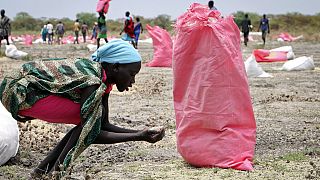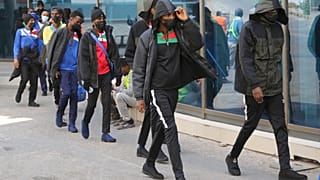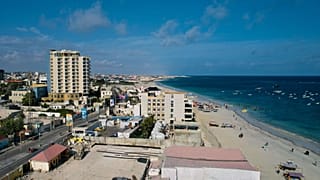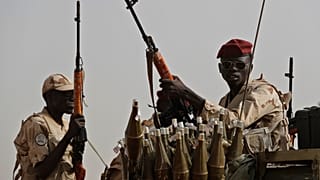Somalia
The situation at a refugee camp in the Somali border town of Dollow is desperate. Hundreds of people have arrived there in the past few days.
As water drums wait to be filled, newly displaced people are sweeping the dry and dusty land as they prepare to set up tents.
Just days ago, the United Nations warned that hundreds of thousands of people in Somalia are facing starvation, after almost four years of drought.
Seventy-five-year-old Issack Farow Hassan travelled a long distance from his village to the camp.
‘In Ufurow, we had nothing to eat and were forced to move by the drought. We came all the way to Dollow and we arrived the day before,’ he said.
He is sitting inside a tent next his old friend, 80-year-old Mohamed Kheir Issack.
‘There was no-one to look after us, but we still thank God. We couldn't even fend for ourselves. On our way to Dollow, there were no NGO's or any sort of help. We walked for an entire week with no food at all and no-one to give us shelter,’ Issack said.
The two elderly men, both of them blind, are part of an unwilling migration that has seen more than one million Somalis flee their homes in search of food and water.
Worse drought in memory
For generations, pastoralists and farmers in Somali have known where to take their cattle, goats, and camels when the usual water sources run dry. But the two men say they have never experienced a drought like this before.
Experts believe that the climate shocks are now coming more frequently and for longer periods of time, giving people and the country less time to recover and prepare for the next one.
‘Some 300,000 people are looking down the barrel of catastrophic food insecurity and many of them are coming here,’ says Petroc Wilton, a World Food Programme spokesperson.
‘This section behind me wasn't here 48 hours ago. Hundreds of thousands of people are flooding into these camps, looking for assistance every day. You can really see the scale of the problem,’ he said.
Wilton says urgent action is required to prevent the situation from getting much worse.
‘As of August, we reached 4.4 million people with humanitarian relief. That's more than we've ever reached in Somalia. We reached almost half a million with nutrition support. It is making a difference. We’ve kept the worst at bay so far, but famine right now is an imminent reality in those parts of the bioregion and that could spread if it breaks out. So this really is the final warning to act now to get the resources, to keep the scale up going,’ he said.
Food security requires peace
For Issack and Hassan, returning home after drought will be difficult, in part because the area of Somalia they come from is controlled by the al-Qaeda affiliate, al-Shabab.
The group has reportedly made it almost impossible for humanitarian assistance to reach areas under their control.
Speaking in Nigeria a few days ago, the Africa regional representative for the Food and Agriculture Organization, Abebe Haile-Gabriel, that only 'sustainable solution' to food insecurity was 'peace'.











01:35
Haitians try to rebuild lives in aftermath of Hurricane Melissa
01:48
United States: Vermont school district receives threats after putting up Somali flag
01:02
First rain of autumn falls in Iran's capital after months of intense drought
01:00
Trump deportation push sparks clashes in Minneapolis
02:19
Somalia's poets keep hope alive for storytelling and for peace
01:00
Pix of the Day: December 8 , 2025